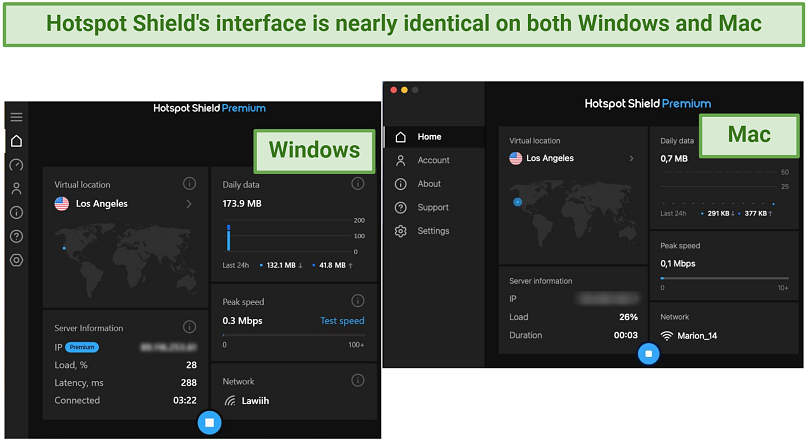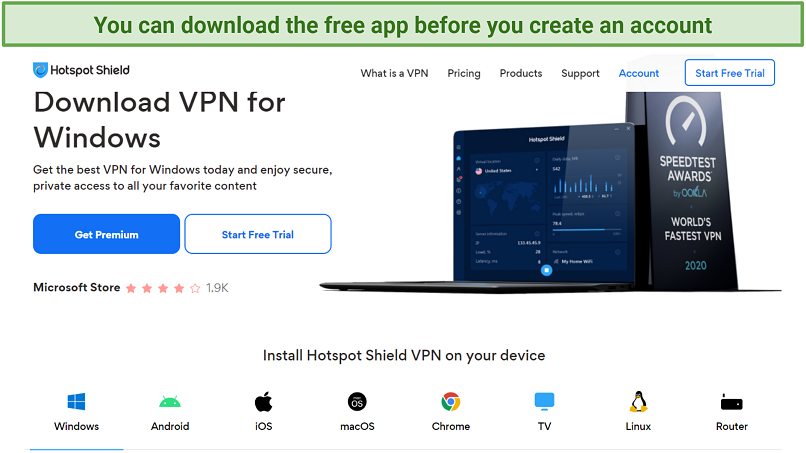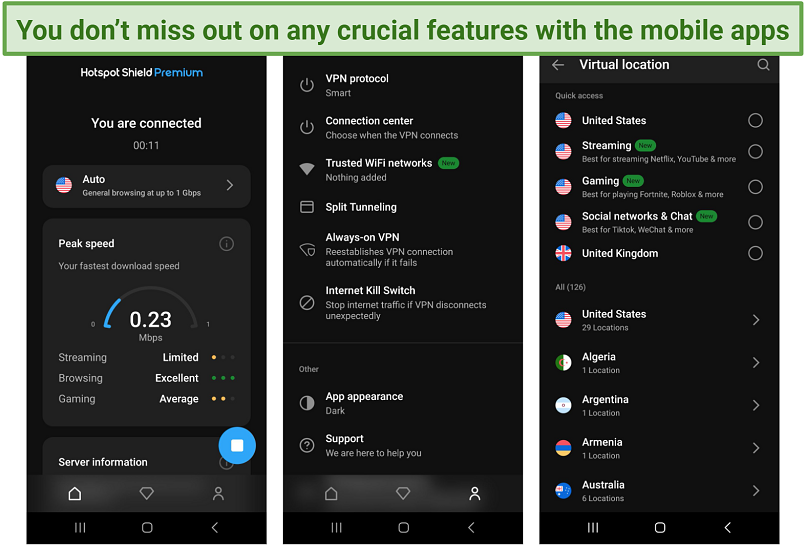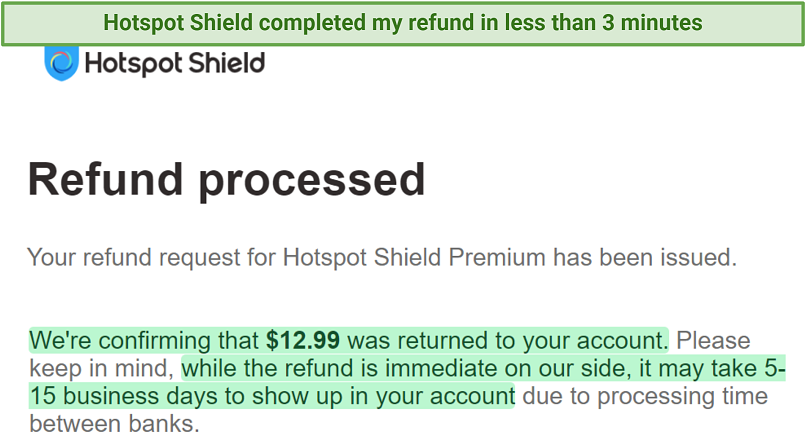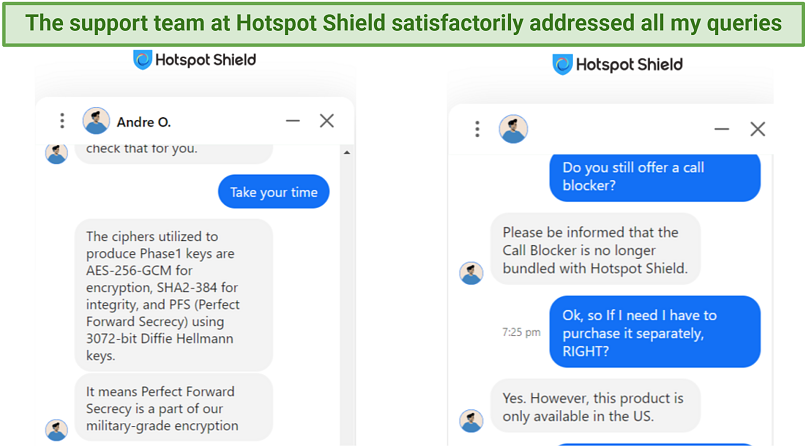Hotspot Shield is a VPN that’s undergone many changes recently. After dealing with several controversies, it overhauled its logging policy and is under new management. So, has it gotten better?
My global team and I tested everything it offers to see if Hotspot Shield (HSS) is safe. We fully explored its logging policy and found out if its security features can prevent data leaks. We also tested its speeds, customer support, streaming and gaming capabilities, and more.
Our tests showed that Hotspot Shield is a top-quality VPN in nearly every category. It has great security features, reliable customer support, and a more precise no-logging policy. Only a few small issues keep it from ranking at the very top. The free version isn’t a bad way to try it, but you can explore all of its features with its 45-day money-back guarantee. I tested its refund policy to make sure it’s trustworthy, and it was easy to get a full refund.
Try Hotspot Shield Risk-Free >>
Hotspot Shield Pros, Cons, and Needed Improvements
-
Unproven privacy policy
Its no-logs policy has been dramatically improved but still hasn’t been audited.
-
Lacks smart DNS
You can't easily install the VPN to stream on devices that don't inherently support VPNs, like gaming consoles and smart TVs. A workaround is to install Hotspot Shield on your router.
38% Off
Save 38% on Hotspot Shield today!
Money-Back Guarantee: 45 Days
Take advantage of this limited offer now!
Hotspot Shield Features — 2025 Update
9.2
|
💸
Price
|
7.99 USD/month
|
|
📆
Money Back Guarantee
|
45 Days |
|
📝
Does VPN keep logs?
|
No |
|
🖥
Number of servers
|
1800+ |
|
💻
Number of devices per license
|
10 |
|
🛡
Kill switch
|
Yes |
|
🗺
Based in country
|
United States |
|
🛠
Support
|
24/7 Live Chat Support |
|
📥
Supports torrenting
|
No |
Streaming — Works Reliably With Popular Platforms
8.9
Hotspot Shield Premium successfully worked with nearly all the platforms we tested. The streaming quality was great for the most part, too, with only a few exceptions. But, this is only true of the paid app.
The free version only worked with Peacock and Max, but the experience wasn’t great as the videos loaded slowly, and there was constant buffering. While it could open Disney+, ITVX, BBC iPlayer, and Amazon Prime Video, it didn't let us play any videos. When we tested it with Netflix, we got an error message. However, it does offer unlimited data, which I can’t say for many other free options.
The premium version offers streaming-optimized servers in the UK and the US. These servers are regularly tested to ensure they support HD streaming from anywhere. However, they didn’t perform better than the regular servers in our tests.
Editor’s note: Hotspot Shield follows a strict no-logging policy, meaning it doesn't track your streaming behavior. So, you are responsible for how you utilize the VPN. It's essential to comply with all relevant laws and streaming platforms' rules. My team and I don’t condone copyright infringement, so please use VPNs responsibly.
Works With: Netflix
In our tests, Hotspot Shield worked with several Netflix libraries, including the US, the UK, Germany, Japan, and Canada. Unfortunately, we had trouble streaming the Netflix Brazil library, though. With only one server located there, it was difficult to determine whether the issue was with that particular server.
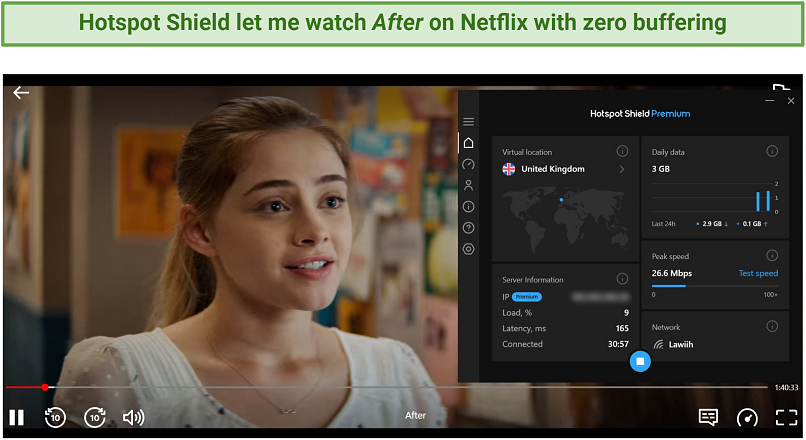 Both regular and streaming-optimized UK servers worked with Netflix
Both regular and streaming-optimized UK servers worked with Netflix
Though this was the only premium server that didn’t work, we also had a few other minor issues. For instance, there was a very long loading time when we tried to watch French Netflix with its servers in France.
However, it was impressive to see the VPN’s performance with a variety of Netflix libraries, as most VPNs aren’t that reliable.
Works With: Disney+
We could easily watch Disney+ with Hotspot Shield in HD buffer-free. It did take about 10 seconds for the video to load, and it paused to load briefly whenever we skipped around. Otherwise, it played in great HD quality without buffering.
Works With: Max
It was just as easy to watch Somebody Somewhere on Max. The platform loaded in under 5 seconds. After it loaded up, we didn’t have any issues while streaming. We could instantly load videos and stream them in the highest quality. There were also no instances of buffering on the former HBO Max.
Works With: ITVX
We were impressed at how well the VPN worked with ITVX. The website loaded immediately, and live-streaming and watching went smoothly in crystal clear quality.
Its UK streaming servers proved to provide reliable HD access to UK content. However, I do hope it adds streaming-optimized locations from more regions in the future. Some of its competitors have similar servers in 10+ countries spread around the world.
Also Works With: Amazon Prime Video, Peacock, All 4, BBC iPlayer, and YouTube
Amazon Prime Video, Peacock, All 4, YouTube, and BBC iPlayer loaded quickly during our tests. But when skipping through content on Peacock, there were brief moments of buffering.
Not only can Hotspot Shield safely access a variety of platforms from anywhere, but it also doesn’t require much troubleshooting. There are a few VPNs that can seamlessly work with multiple platforms, but our tests with Hotspot Shield were hassle-free. We never had to switch servers or protocols, which you often have to do with other VPNs.
Doesn’t Work With: Hulu
While we could use the VPN with the other US platforms we tested, Hulu managed to detect VPN usage, and we couldn't even navigate beyond the login page.
Still, we were impressed that it was the only platform we could find that blocked the VPN’s servers. Overall, Hotspot Shield remains a compelling option for access to popular platforms in HD from anywhere.
Speed — Fast on Close Servers; Solid on Distant Locations
9.0
Hotspot Shield Premium provides great speeds on nearby servers and many distant ones too. We were very pleased with the performance of its premium servers. You’ll get the best speeds with Hotspot Shield’s proprietary Hydra protocol. Surprisingly, it was even faster than WireGuard in our tests, which is usually the quickest option.
On the other hand, the free servers were consistently slow. I expected them to be faster since the free version doesn't put any caps on speed. Overcrowding is a common problem with free VPNs, and that was an issue here. For instance, in one test on the Singapore server was more than half full, with a load of 61% during our tests. The free locations were always at least twice as slow as premium servers in our tests, and sometimes much more.
These are the 3 main things we examine:
- Download speeds. This lets you know how quickly you can receive information. You’ll want it fast for things like browsing, torrenting, and HD streaming from anywhere. It’s measured in Mbps (megabits per second).
- Upload speeds. It determines how quickly you send data. If it’s fast, you can send emails and upload videos rapidly. It’s also measured in Mbps.
- Ping. This is how fast your data travels in either direction. It tells you how much latency you’ll have, so it’s most important for gaming. It’s measured in milliseconds (ms).
To ensure fair and accurate comparisons, we perform ongoing tests with the top VPNs from a single location with the same internet connection. Our US-based speed expert conducts multiple tests on each server before creating averages. All of Hotspot’s results come from its premium servers using the Catapult Hydra protocol.
Explore some of Hotspot's results alongside its biggest competitors
 USA (Dallas)
USA (Dallas)
Download Speed
Upload Speed
Ping
 USA (Miami)
USA (Miami)
Download Speed
Upload Speed
Ping
 USA (Los Angeles)
USA (Los Angeles)
Download Speed
Upload Speed
Ping
 USA (New York)
USA (New York)
Download Speed
Upload Speed
Ping
 Canada
Canada
Download Speed
Upload Speed
Ping
 Brazil
Brazil
Download Speed
Upload Speed
Ping
 UK
UK
Download Speed
Upload Speed
Ping
 France
France
Download Speed
Upload Speed
Ping
 Japan
Japan
Download Speed
Upload Speed
Ping
 Australia
Australia
Download Speed
Upload Speed
Ping
 Singapore
Singapore
Download Speed
Upload Speed
Ping
257.20 Mbps
313.82 Mbps
3 ms
175.44 Mbps
146.58 Mbps
9 ms
180.67 Mbps
111.61 Mbps
33 ms
269.01 Mbps
226.68 Mbps
47 ms
264.72 Mbps
177.13 Mbps
40 ms
232.86 Mbps
171.69 Mbps
41 ms
144.55 Mbps
247.28 Mbps
152 ms
234.34 Mbps
198.08 Mbps
117 ms
193.56 Mbps
297.04 Mbps
118 ms
92.18 Mbps
134.13 Mbps
143 ms
128.06 Mbps
191.25 Mbps
192 ms
217.22 Mbps
125.99 Mbps
207 ms
203.60 Mbps
46.40 Mbps
5 ms
150.32 Mbps
55.06 Mbps
8 ms
166.89 Mbps
111.88 Mbps
53 ms
169.57 Mbps
66.42 Mbps
42 ms
175.09 Mbps
46.30 Mbps
45 ms
158 Mbps
80.81 Mbps
50 ms
139.03 Mbps
68.73 Mbps
228 ms
133.12 Mbps
89.52 Mbps
115 ms
158.51 Mbps
62.77 Mbps
118 ms
134.14 Mbps
42.65 Mbps
152 ms
142 Mbps
115.86 Mbps
173 ms
150.43 Mbps
85.31 Mbps
211 ms
218.73 Mbps
50.42 Mbps
6 ms
169.58 Mbps
83.50 Mbps
9 ms
143.62 Mbps
77.82 Mbps
54 ms
161.10 Mbps
103.06 Mbps
42 ms
8.23 Mbps
8.39 Mbps
64 ms
186.87 Mbps
63.28 Mbps
150 ms
70.57 Mbps
102.14 Mbps
114 ms
111.83 Mbps
95.40 Mbps
120 ms
87.54 Mbps
11.23 Mbps
193 ms
128.44 Mbps
10.25 Mbps
208 ms
These tests are conducted from the USA
*N/A indicates that we do not currently have speed test data for this location
There are only a few VPNs we’ve tested that are faster than Hotspot Shield. On average, most VPNs will drop your speeds by around 10-20% on nearby servers, and HSS is consistently several times faster. A lot of VPNs will also lower your speeds by 65% or more when you get past 6,000 km away, but our average long-distance speed with Hotspot is normally much better than that too.
The only small issue is you might get slower speeds than you expected due to its virtual servers. For example, we’ve seen the server in India experience steep speed drops. But, that server is physically located in Singapore, which is farther away from our tester than India is.
Gaming — Optimized Servers Are Great for Lag-free Play
9.2
HSS is ideal for online gaming. In my tests, it allowed me to play Dota 2 without problems. It let me enjoy the thrill of coordinating with teammates, executing well-timed maneuvers, and outsmarting opponents to secure victory without any lag.
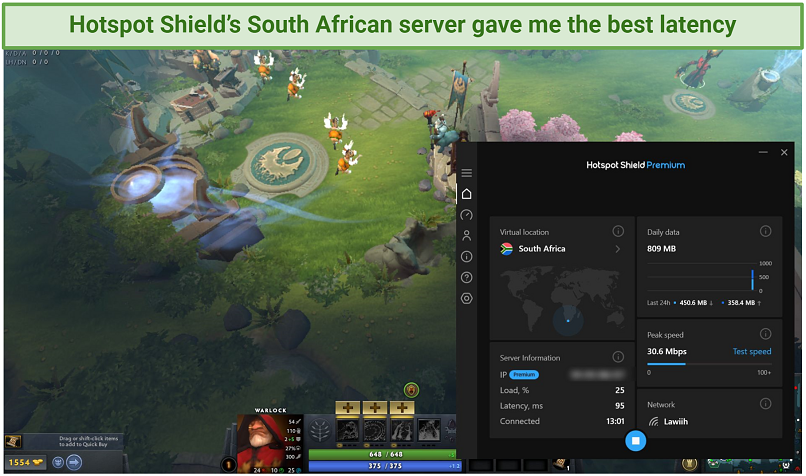 A ping rate below 100 ms is recommended for a smooth gaming experience
A ping rate below 100 ms is recommended for a smooth gaming experience
The South African server consistently gave me a ping rate below 70 ms. I also tried its gaming servers, but the experience wasn’t that impressive because of the high ping rate they returned, over 200 ms. These servers are meant to enhance gaming performance. However, I recommend sticking with the closest server to you if you live far away from the United States.
Server Network — Good Coverage With Reliable Locations
9.0
Hotspot Shield has 1,800 servers in 80 countries and 35+ cities. Its coverage is expansive, stretching across the Americas, Europe, and Australia and extending to the Middle East, Asia Pacific, and even Africa. I like that it offers many countries you don’t often see in VPNs like Bhutan, Nepal, and even the UAE.
You get the most countries to connect to in the European continent (48). There are also a ton of locations in Asia (28). Africa gets the least, with only 3. However, there are many VPNs that completely neglect this continent, so it’s better than what most offer.
It ranks near the top when it comes to how many locations it has, but there are a fair amount of VPNs that offer more servers. This can help improve speeds by cutting down on overcrowding, which could explain why CyberGhost, ExpressVPN, and a few others are just a little faster.
The city-level servers are in the US, Italy, Spain, Australia, Canada, France, and the UK. These help you pinpoint your location more precisely, and you get the most options in the US.
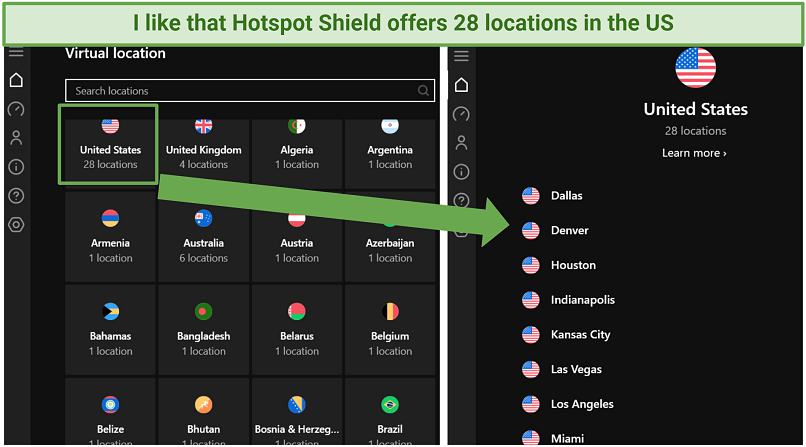 ExpressVPN and PIA offer more, but there aren’t many other VPNs that match this
ExpressVPN and PIA offer more, but there aren’t many other VPNs that match this
Hotspot Shield also owns all its servers, which makes it more privacy-friendly. I always love it when VPNs maintain exclusive control over their servers, as they eliminate any intermediaries that could pose potential threats to your privacy.
Connecting to servers is quick too; it only takes about 10 seconds on average. It also has an Auto option that sets you up with the fastest city-level server in the US. But, I was a little disappointed that this only applies to one country. Most VPNs have a similar feature, but they usually attempt to connect you to whichever location will be the fastest for you out of every location in their network.
Should you encounter connection problems with a server, there are 2 simple tricks that worked for me. First, switch to a different protocol or set it to Automatic so that it chooses the best one for you. If that doesn't solve the problem, you can reach out to its 24/7 customer support for assistance.
Unfortunately, it doesn’t offer RAM-based and private DNS servers, which provide an extra layer of protection. I also wish it offered dedicated servers, which can come in handy if you’re running a website. Many of its competitors let you pay a little extra for static IPs, and a select few like hide.me, offer them for free.
Free Servers
You can connect to 5 locations with the free app on Windows and Mac. These are located in Los Angeles, New York, the UK, and Singapore. You also get to connect to the Auto option, which can give you a fifth location, if one of the cities listed above isn’t the fastest at the time.
However, you only get 1 location with mobile apps. So, while Hotspot Shield is still one of the best free VPNs, you can get more servers on your phone with other free options.
Virtual Locations
You can connect to a ton of locations with Hotspot Shield because all its servers are virtual. Virtual servers let you connect to an IP in one country, but they’re located somewhere else. This gives you a safer alternative to physical servers in countries where it might not be wise to house them, like China. The downside is how they can affect your speeds as you saw in our tests.
Optimized Servers
Hotspot Shield’s optimized servers are definitely a plus, but I hope it expands on them. Currently, the streaming servers can only connect you to the US or the UK. The gaming server is also restricted to the US, and you saw how that made it a bad option in my tests.
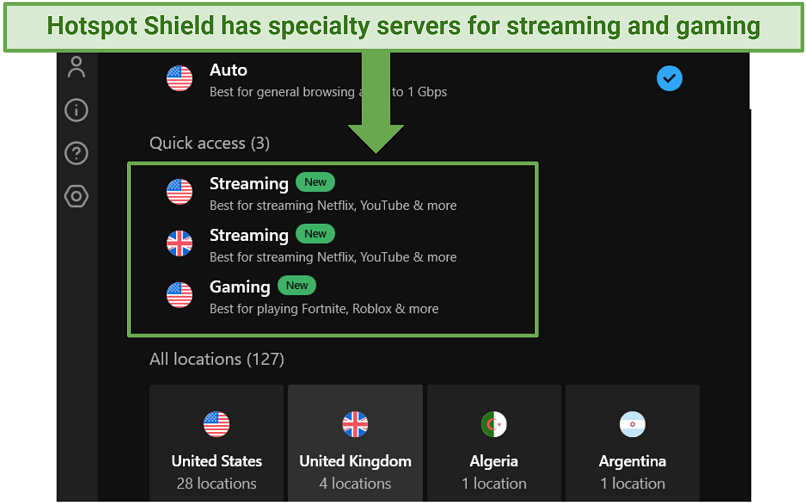 Mobile apps also offer a specialized server for social networks and chat like Tiktok
Mobile apps also offer a specialized server for social networks and chat like Tiktok
Some VPNs offer more with their optimized servers. For example, CyberGhost has servers set up for specific streaming platforms, and they let you connect in many more countries. It also offers optimized servers for torrenting. However, Hotspot Shield’s solid performance in every category means this isn’t a big issue.
Security — Keeps You Safe Online With Advanced Features
9.2
Hotspot Shield offers all the necessary features you’d expect in a top VPN. It’s highly secure as it never revealed my true location, which I found out after running tests on 15+ servers.
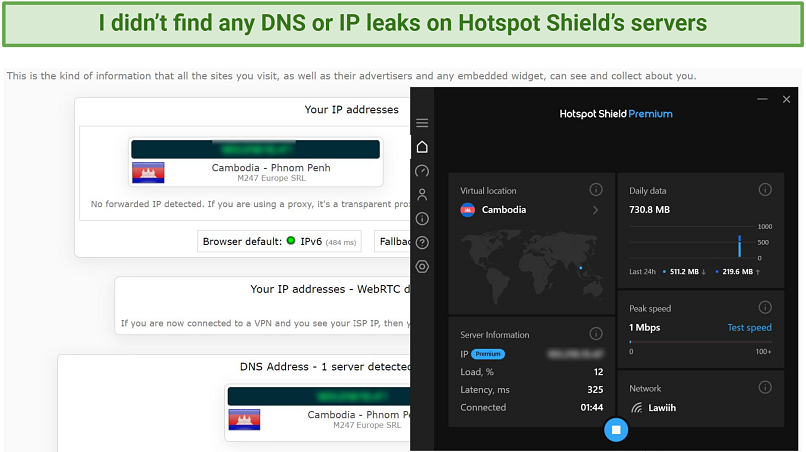 The tests could only detect HSS's IP in Cambodia, even though my physical location was different
The tests could only detect HSS's IP in Cambodia, even though my physical location was different
Even though there are some rumors the app contains viruses or malware, that wasn’t the case in my tests. There were zero security flags on VirusTotal, a website that lets you see if companies like Avira, McAfee, or BitDefender have been blocking the setup file you upload.
You also get to use all of its security features with a free account, besides one missing protocol. Speaking of that, I do wish it offered OpenVPN. It’s also missing a multi-hop feature. This lets you route your traffic through 2 servers, but it’s really not necessary with the powerful encryption Hotspot Shield offers.
It also stopped bundling its call blocker (Robo Shield) with premium accounts. This feature attempts to block spam calls to your phone. It was a unique feature, but it didn’t necessarily increase your security, so I don’t really mind. It’s still available to purchase separately, but only in the US.
Encryption
HSS uses military-grade encryption (AES 256-bit) to make your data unreadable to third parties. This encryption is used by institutions like banks to secure classified information. It’s nearly impossible to break since it creates an encryption key so long it would take a supercomputer 100s of years or more to crack it.
It also uses Perfect Forward Secrecy to routinely change your encryption keys. This way, even if an old key is compromised (as unlikely as that is), your data remains protected with a new one. These are standard features for top VPNs, so I’m glad Hotspot Shield utilizes them.
Security Protocols
The VPN supports secure protocols, including its proprietary Catapult Hydra option that’s streamlined for faster connections. Hotspot Shield’s Hydra protocol helps conceal your VPN usage from internet service providers and DPI (Deep Packet Inspection) systems too. This is helpful if you’re in a country with restricted networks.
The WireGuard protocol is also built into its apps — many VPNs include it because it uses less code to boost speed. Even though Hydra was faster in my tests, I always like to see WireGuard on offer. Another plus is that it’s open-source. Hotspot hasn’t made Hydra’s code open to the public, but you can use WireGuard as an alternative if you feel safer with a protocol that’s publicly scrutinized.
There's also IKEv2 (IPSec), a reliable protocol that is particularly useful for mobile devices since it can quickly reestablish connections.
Both WireGuard and Hydra drain less battery as they’re less resource intensive. So, you’ll have to decide between quicker connections or battery power when you’re using HSS on your phone. Some VPNs do offer more protocols, and I especially hope it considers adding OpenVPN in the future. But, this is still a solid selection of protocols. However, be aware that IKEv2 isn’t available with the free version.
Kill Switch
This feature automatically cuts off your traffic if you lose connection to the VPN, reducing the chances of your IP and online activity being exposed. It ensured my connection remained protected while switching between servers. You’ll need to enable it yourself, and it's currently limited to the Windows app for the free version.
Split Tunneling
You can use this feature to choose which traffic is routed through the VPN. I like to use it to get local Google search results while gaming with a foreign IP. I’m glad that Hotspot Shield no longer calls this SmartVPN in its Windows app. That could be confusing because I’ve seen VPNs use that title for their auto-connect feature, which HSS also offers.
Auto-Protect
This is what Hotspot Shield calls its WiFi-protection function. This activates the VPN automatically upon detecting a connection to a new network, like public WiFi hotspots. It's a nice feature to have, especially if you connect your laptop or phone to coffee shop networks all the time like I do. There’s also an option to have the VPN connect on launch.
Malware Protection
Hotspot Shield keeps you a step ahead of potential online threats with malware detection for both desktop and mobile apps. It scans the websites you visit for threats and warns you about viruses, phishing, infected sites, dishonest adware, and other malicious programs. I like that you only have to connect to the VPN to enable this feature. HSS also offers its own antivirus software, available as a separate purchase.
The Onion Router (Tor) Compatibility
The VPN supports Tor usage across all servers. Using Tor over a VPN connection offers more protection than a regular Tor connection, as it shields against potential IP leaks that may occur during your Tor session. While such leaks are uncommon on the Tor network, should one occur, only the VPN's IP address would be revealed, keeping your actual IP address hidden.
Privacy — Doesn’t Store Your Identifiable Information
8.4
Hotspot Shield has a solid no logging policy, but there are a few improvements it could make. After several incidents, the company made big changes to its policies. Its past issues include a 2016 CSIRO report highlighting questionable activities, a 2017 complaint filed by the Center for Democracy and Technology, and a 2018 bug that exposed users' information like WiFi details.
After all these, its parent company merged with Aura, and its policies are much more clear. You will get a few extra privacy options when you use the premium version. While it doesn’t store any identifiable information long-term, the free app shares some user information with advertisers. I also wish it was headquartered in a more privacy-friendly country, but it wouldn’t have any vital information to share even if the authorities came asking for data.
Does Hotspot Shield Keep Logs? No
HSS claims it doesn’t log or share your browsing history with anyone. The VPN collects the duration of VPN sessions (timestamps), device hashes, and how much data you use. All of this is anonymized, meaning it’s not associated with any of your account details. While it records the server locations that its users connect to, this data is also anonymized, so they’re not linked to you.
It also calculates a rough estimate of your location while you’re connected to the VPN to find your nearest server locations. While this did worry me at first, I was happy to see that information about your location is deleted as soon as the VPN session is terminated.
When you use the free app, the advertisers Hotspot Shield works with might have access to the information it uses to maintain its services. This means that they can possibly see the server you’re on, what device you’re using, and the other information I detailed above. So, if you’re especially privacy conscious, I’d stick with the paid version.
While I’m comfortable with what HSS records, there are certainly some top VPNs that access less of your data. One other small issue is that it doesn't support cryptocurrencies. I like to use this mode of payment with a temporary email address to limit the data I share with a VPN. So, I hope it lets you use crypto in the future.
Was Hotspot Shield Audited? No
HSS's privacy policy hasn't been assessed yet, but its Hydra protocol has undergone an audit. I value the fact that this demonstrates its openness to the idea. Nevertheless, a lot of its primary rivals have had their complete privacy policies audited to indisputably substantiate their assertions. Given its previous controversies, I anticipate that a credible firm will scrutinize its policies in the future.
Based in the US
The US is a member of the 5 Eyes Alliance. The alliance is a group of countries that have agreed to share their citizens’ data with each other. However, Hotspot Shield doesn’t store any of your identifiable information, so it would have nothing to share if it was asked. On the other hand, I wish it kept up with its transparency reports. These show you when data is requested of a VPN company, but it hasn’t published one for several years.
Does Hotspot Shield Work in China? Yes
The VPN confirmed you can access your home country's online services from China.
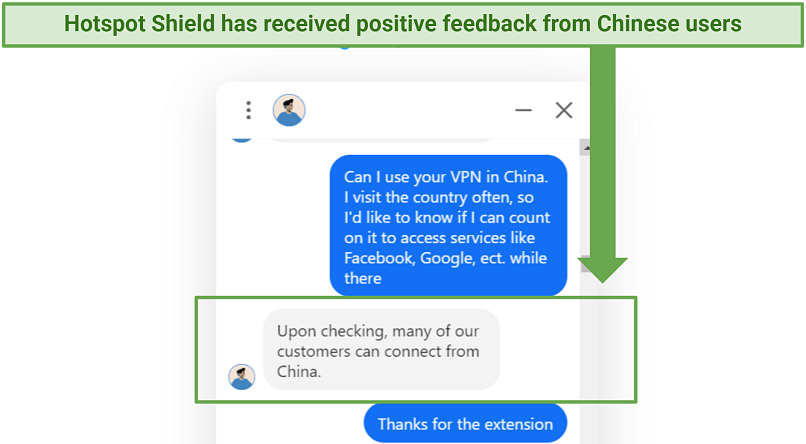 Hotspot Shield uses obfuscated servers to remain undetected
Hotspot Shield uses obfuscated servers to remain undetected
While many VPNs are banned in China, the government seldom targets individuals who use them. However, my team and I don’t condone any illegal activities. Before you decide to use a VPN, we recommend you read up on the laws of the country you’re in.
Torrenting — Supports P2P on Every Server With Great Performance
9.4
Hotspot Shield helped me maintain short download times during my tests. I was able to complete a 431 MB file in just 2 minutes and 40 seconds while connected to a US server (12000+ km away). Without a VPN connection, I can download the file in 1 minute and 55 seconds, so the VPN hardly increased my wait time. However, the free servers made it take over 5 times as long, most likely due to high load.
With the closest server to me in the UK, I could download the file only a few seconds faster. So, I was impressed that I could torrent quickly on servers both near and far. Its robust DNS/IP leak protection and kill switch provided a sense of security while downloading torrents, and I also love that you can use P2P on any server.
While the act of torrenting itself is generally not illegal in the majority of countries, acquiring copyrighted materials typically is. To ensure you're in compliance with your country's regulations, it's important to be well-versed in its laws and to limit your downloads to files that are in the public domain.







